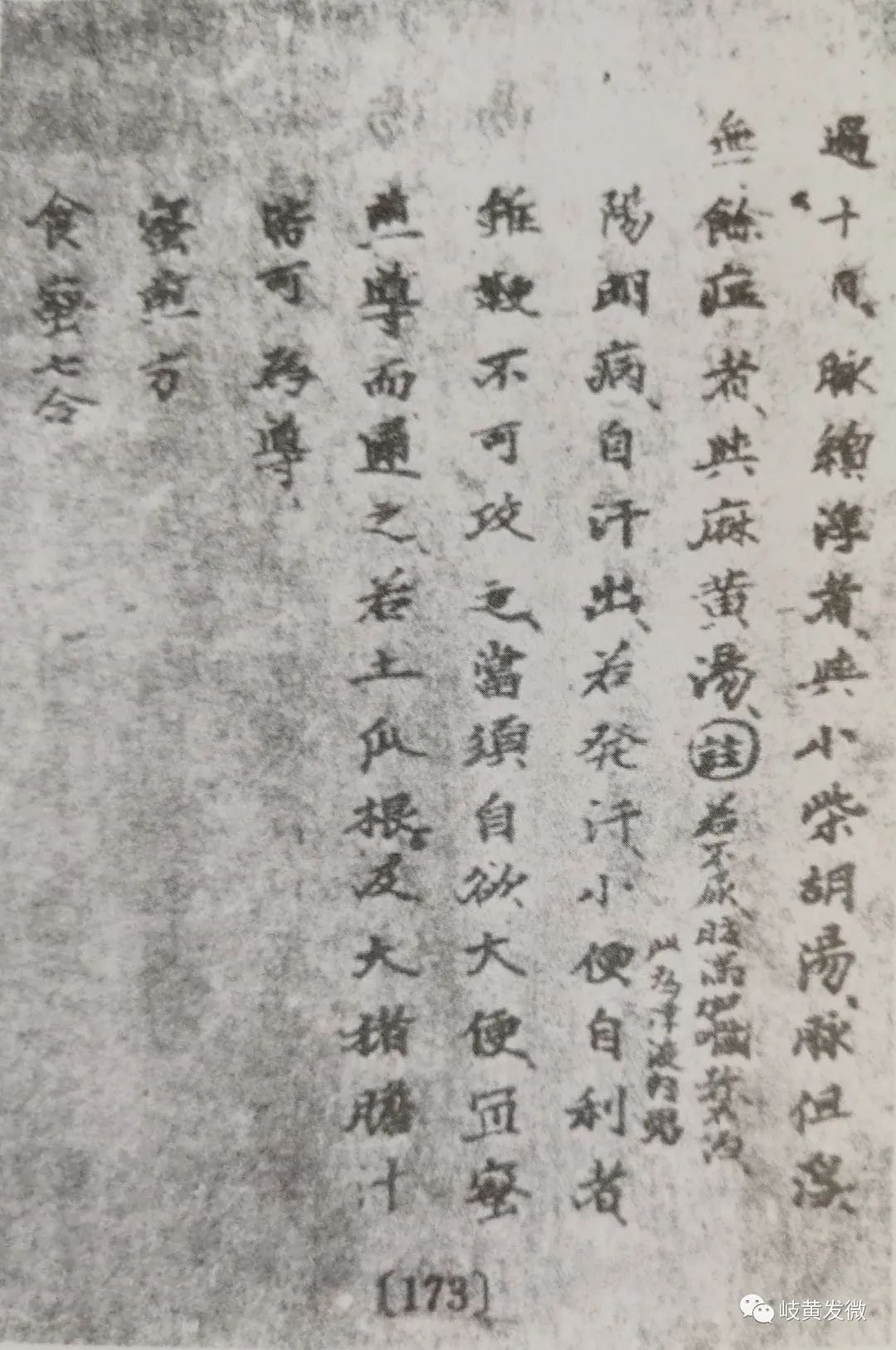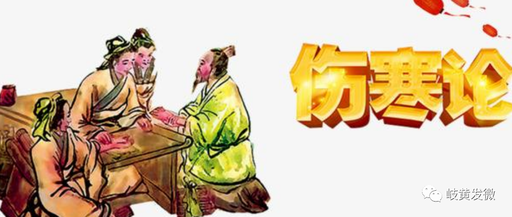Article 233: Yangming disease, with spontaneous sweating and urination, if sweating is induced, this indicates that the body fluids are depleted. Although the stool is hard, it should not be forcibly expelled. One must have the desire to defecate, and honey decoction should be used to facilitate this. Both the root of the earth melon (Tudougen) and pig bile can be used as laxatives. This article mainly discusses three external treatment methods for fluid deficiency constipation. “Yangming disease, with spontaneous sweating and urination,” refers to the condition where spontaneous sweating occurs. If one mistakenly identifies it as Taiyang disease and uses sweating methods, it will lead to the loss of body fluids and deficiency of fluids in the stomach. In this case, the body will self-regulate; urination acts as a regulating valve. If urination decreases, the body fluids will return, and if the stool becomes hard, it corresponds to the situation described in Article 203: “In Yangming disease, if spontaneous sweating occurs and the physician insists on inducing sweating, the condition may improve slightly, but if the patient still feels slightly uncomfortable, it must be due to hard stool. This is because of the loss of body fluids, leading to dryness in the stomach, which causes hard stool. One should inquire how many times the patient urinates daily. If the patient usually urinates three to four times a day and today has urinated again, it indicates that the stool will not be expelled soon. Now, if urination is infrequent, it is because the body fluids should return to the stomach, indicating that hard stool will soon occur.” If urination is normal, it indicates that the body fluids cannot return to the stomach. “This indicates that the body fluids are depleted, and although the stool is hard, it should not be forcibly expelled.” “This indicates that the body fluids are depleted,” as noted in the annotations of the Kangping edition. This hard stool is not due to dry feces being compacted, but rather due to the lack of body fluids in the stomach, leading to the intestines losing their nourishment, resulting in hard stool. The master Zhong feared that later scholars would mistakenly identify this as a case for purging with Chengqi Decoction, hence he advised: “Although the stool is hard, it should not be forcibly expelled.” “One must have the desire to defecate,” so what is the difference between “depleted body fluids” and “dry heat accumulation”? Hard stool caused by dry heat accumulation will present with tidal fever, delirium, abdominal fullness, abdominal pain with resistance to pressure, and tenesmus, with the main symptom being the absence of the urge to defecate. Hard stool due to depleted body fluids, aside from the absence of tidal fever, delirium, abdominal fullness, abdominal pain with resistance to pressure, and tenesmus, does have the urge to defecate! The dry feces have already moved from the colon to the rectum, and at the anus, due to dryness in the intestines, they cannot be expelled. Therefore, the prerequisite for using honey decoction is that “one must have the desire to defecate.” The patient has weak vital energy, and the intestinal peristalsis is insufficient, causing the stool to be unable to be expelled from the anus, and at this time, the patient urgently wants to defecate. At this moment, internal tonifying and supportive medications may not be effective, and using Chengqi Decoction to purge will further harm the vital energy; thus, external methods are the quickest and most beneficial for the patient. This method of guiding according to the situation is also applied in modern medicine, such as using glycerin suppositories or soap suds for enemas, which is similar to the honey decoction method. However, glycerin suppositories primarily use the hyperosmotic effect of glycerin or sorbitol to soften the stool, stimulate the intestinal wall to dehydrate, reflexively induce a bowel movement, and with the lubricating effect, make it easier to expel the stool. The hyperosmotic dehydrating effect of glycerin also leads to fluid loss, which is not as effective as the honey decoction method. “Honey decoction should be used to facilitate this,” as recorded in the Xi Fa: “In a copper vessel, simmer over low heat until it thickens to a syrupy consistency, stirring to prevent burning. It should be shaped into pills, with the ends sharpened, about the size of a finger and two inches long. It should be used while hot; if it cools, it will harden. Insert it into the anal canal with the hand, and remove it when the urge to defecate arises.” Nowadays, some people use this method to treat constipation in infants and young children with good results. Zheng Jieyun, an old TCM physician, is the founder of the pediatrics department at the First Affiliated Hospital of Henan University of Traditional Chinese Medicine and is a well-respected expert in pediatrics. Inspired by the honey decoction method, he transformed the external method into an internal method, using thirty grams of honey, three grams of salt, and water to take on an empty stomach once a day, which has shown good effects in treating habitual constipation in children and age-related fluid deficiency constipation in the elderly. So, is the honey decoction method merely utilizing the lubricating effect of honey? Refer to Article 184: “Yangming resides in the center, governing the earth;” honey is sweet and belongs to the flavor of the center, which, while lubricating the intestines and facilitating bowel movements, also has a tonifying effect on the earth. “Guiding” implies expelling the evil of Yangming. “It is doubtful that this was the intention of Zhongjing, but it has been proven to be very effective,” which is an evaluation of the efficacy of the honey decoction method. Although it may not necessarily be the method of Zhongjing, its effectiveness is certain. “Both the root of the earth melon and pig bile can be used as laxatives,” which are two types of enema methods. Although the method using the root of the earth melon is lost, it is still recorded in ancient texts such as the “Zhou Hou Fang”: “To treat constipation: crush the root of the earth melon, mix with a little water, and blow it into the anus. If both urination and defecation are obstructed, blow it in from both ends to achieve relief.” Refer to the “Wai Tai Mi Yao”: “Take fresh root of the earth melon, crush to extract juice, dilute with water, and blow it into the lower part, which will relieve the obstruction.” This is the method of using fresh juice from the root of the earth melon mixed with water for an enema. The root of the earth melon is bitter and cold, with bitterness entering the heart, obtaining the qi of the Shaoyin fire, and the fire generates earth, which still has a tonifying effect on the earth. “Pig bile” is considered a water animal among the six domestic animals. Mixing pig bile with a little vinegar, “to be used for an enema, will expel long-held food and harmful substances within a meal, with significant effect.” Bile is bitter, and vinegar is sour; the combination of sour and bitter promotes drainage, which is a method for moistening dryness and facilitating bowel movements.
Attached is a medical case by Cao Yingfu: A disciple, Zhang Yongnian, recounted a case of a patient surnamed Chen, treated by a physician from Four Ming, Zhou, using pig bile for an enema, which was effective and worthy of reference. It was said that the patient initially had hemoptysis, dark purple in color, and after being treated with hemostatic injections by Western medicine, the bleeding stopped. The next day, the patient experienced abdominal fullness and increasing discomfort. After half a month, there was no bowel movement. Initially, honey decoction was ineffective, and then an enema method was tried, which also did not work. After using all kinds of Western medications to facilitate bowel movements, there was still no result. Someone advised Chen to consult Zhou, a good physician from the same hometown. Chen was pleased and sent for Zhou, who found that the pulse showed no disease, and the problem was solely in the intestines. He instructed the family to find pig bile, pour it into a bowl, mix it with vinegar, and use a Western enema device to administer it. As soon as it was administered, there was continuous tenesmus. Before long, the stool was expelled, measuring about three inches, and made a sound when it hit the ground, without any damage. After soaking it in clean water for about half a day, the bowl was emptied of red liquid. It was then understood that the blood vomited the previous day was actually due to blood stasis, which was stopped by the Western medicine needle, leading to the formation of hard stool in the large intestine, causing the illness. After seven days, there was still no bowel movement, and the previous method was used again, resulting in several dry stools, each about three inches long, and the patient was then cured. I realized from this that the honey decoction method is only suitable for those with relatively mild symptoms. The root of the earth melon is also not easy to obtain. However, pig bile is readily available at all times. It is a pity that modern physicians have abandoned this good method.

Article 234: Yangming disease, with a slow pulse, excessive sweating, and slight aversion to cold indicates that the exterior has not been resolved; sweating can be induced, and Gui Zhi Tang (Cinnamon Twig Decoction) is recommended. Pre-class discussion: 1. Wu Qian in “Yizong Jinjian” states: “In cases of excessive sweating, there should be the words ‘fever’; if these words are absent, a slow pulse, excessive sweating, and slight aversion to cold indicate exterior Yang deficiency, which corresponds to the formula of Gui Zhi Fu Zi Tang (Cinnamon Twig and Aconite Decoction). How can one use Gui Zhi Tang to induce sweating? This must be a transcription error.” Therefore, can this article include the word ‘fever’? 2. In Yangming disease with wind, excessive sweating should correspond to a rapid or strong pulse; why is it slow? 3. When faced with a patient with a slow pulse, excessive sweating, and slight aversion to cold, how do we differentiate whether it is Taiyang disease or Yangming disease?

